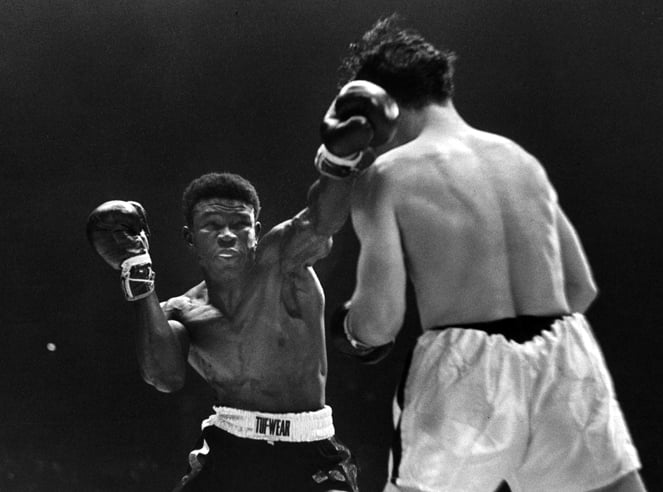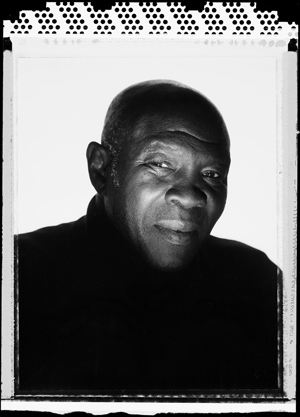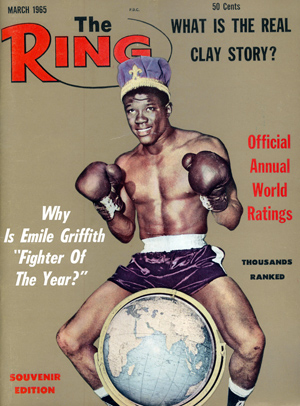Boxing world remembers Griffith


Former welterweight contender Harold Weston says Emile Griffith was able to fight at the world-class level for most of his hall-of-fame career, which spanned 19 years – from 1958 to 1977 – and 112 bouts, because the beloved former welterweight and middleweight champ, who passed away at age 75 on Tuesday, possessed expert technique.
“One of the reasons he lasted so long was because he was such a technician,” Weston, a two-time title challenger who idolized Griffith and literally grew up around the Virgin Islands transplant at the New York City Parks Department Gym where both trained, told RingTV.com’s Tim Smith.
“He was the best 15-round fighter in history. He went 15 rounds more than any other boxer in history.”
That’s not entirely true. Griffith fought the 15-round distance an astounding 17 times, but it was a feat equaled by Mexico’s hall-of-fame enshrined former flyweight champ Miguel Canto.
However, Griffith holds the distinction of fighting more RING-rated fighters than any other boxer in the International Boxing Hall of Fame, according to The Boxing Register, the Hall’s official record book.
Griffith faced 39 top-10 contenders, as recognized by THE RING magazine, many of whom he fought multiple times, including fellow hall of famers Luis Rodriguez, Dick Tiger and Nino Benvenuti, as well as Denny Moyer, Gaspar Ortega, Ralph Dupas, Joey Archer, Stan Hayward, Ernie Lopez and Bennie Briscoe.
The champion/contender that Griffith is, unfortunately, connected to the most is Benny Paret, who died from head injuries suffered after being brutally stopped in the 12th round of their third bout in New York City in March 24, 1962.
Much has been said and written about the death and the reasons for the Griffith’s intense rivalry with Paret, but those who had the honor of knowing Griffith understand that the former champion was far more than his triumphs and tragedies.
RingTV.com staff writer Lem Satterfield recently gathered comments on Griffith from members of the boxing community, including Sugar Ray Leonard and New York-based promoter Lou DiBella, who helped publish a book about Griffith’s life.
 “I view Emile Griffith as one of the greatest middleweight champions in the history of boxing,” DiBella said of Griffith, a native of the Virgin Islands who lived in New Jersey, Queens and Long Island, but forged his legend while fighting out of New York City.
“I view Emile Griffith as one of the greatest middleweight champions in the history of boxing,” DiBella said of Griffith, a native of the Virgin Islands who lived in New Jersey, Queens and Long Island, but forged his legend while fighting out of New York City.
“Emile was one of the greatest fighters that New York City every produced, period. If you’re going to make a list of fighters who are the greatest in the history of boxing, Emile Griffith is on any list.”
Griffith’s legacy includes an admission of his bisexuality in 2005. The fighter’s sexuality was insulted by Paret, who used a derogatory Spanish slang term for homosexual at the weigh-in before their fateful rubber match.
“The Benny Paret fight was a horrible tragedy, with its entire back story, and I think that it was well-told in ‘Ring of Fire,’ the Dan Klores documentary, but there was much more to Emile Griffith than the Benny Paret story,” said DiBella, whose publishing company helped produce a book entitled“Nine, Ten and Out! The Two Worlds of Emile Griffith,” by Ron Ross.
“I really knew Emile for many, many years, and that’s one of the reasons that when Ron Ross needed a publisher for that biography, ‘Nine, Ten and Out!’ we published it, because I thought that it needed to be published. I thought that Emile’s life was so much more interesting and important.”
Leonard had the pleasure and honor of getting to know Griffith.
“I’d watched him in films, and that’s what I really knew about him, but then I had the chance to meet him,” Leonard told RingTV.com. “I was trying to put the two together, because he looks meek and mild in person. I guess that I carry the same look, if you will. He was so nice to me and so pleasant, the way that he was talking. He always laughed. He always said something funny. Those are my fondest memories about him.
“I saw the documentary about Benny Paret, about how (Griffith) was taunted because of his sexuality and his sexual preference. I always felt that if he was fighting and living now, that wouldn’t be really a big issue. Some of my friends are gay. It’s no big deal. They’re my friends, and life has indeed changed for people like Emile. We have an African American president. Things have changed.
“When I watched the (fatal) fight with Paret, I watched it over and over. I must have watched it a thousand times. I was just trying to find out what was going on in his mind, because he really tried to hurt him because of what Paret said about him. But when it was over, and all was said and done, you know, I saw that in his eyes, he didn’t mean that. He didn’t really mean to take that man’s life. At that precise moment, he was trying to kick his butt, but after the fact, 10 days later, two years later, I’m sure that it bothered him. I’m sure that it ate at him like it ate at me when I was sexually abused. How do you keep that inside? Who do you talk to? What do you read? What pamphlets do you read to deal with something like that that is that close to your heart, and your brain and your mind?
“The only way that you can deal with that, which is what I did, and what he was able to do at some point, is to surrender. You just let it go. You’re not ‘Sugar Ray Leonard, the champ,’ and you’re not and the celebrity and all of this. You’re not ‘Emile Griffith, the champion.’ You’re a man, and you want to say, ‘Hey, I’m so, so sorry from the bottom of my heart that this thing did happen, and that my hands destroyed and took a man’s life.’ That’s some powerful stuff, and some painful stuff.”
Harold Lederman, HBO’s boxing commentator and judge, was ringside for Griffith’s third fight with Paret. Lederman, a former official boxing judge, also judged Griffith’s second victory over Dick Tiger in 1970 as well as his loss to Vito Antuofermo in 1974.
Lederman, who knew Griffith well, was in tears during his interview with RingTV.com.
 “Oh Gosh, I have to get a hold of myself. I liked him. I really, really liked him,” Lederman said. “I was around him a lot. Howie Albert and Gil Clancy, his managers, I loved that whole crowd, and now, they’re all gone. Emile was a great fighter. I’ve never seen a guy with more natural ability. Emile had this incredible body, like a ‘V,’ with huge shoulders and no waist at all.
“Oh Gosh, I have to get a hold of myself. I liked him. I really, really liked him,” Lederman said. “I was around him a lot. Howie Albert and Gil Clancy, his managers, I loved that whole crowd, and now, they’re all gone. Emile was a great fighter. I’ve never seen a guy with more natural ability. Emile had this incredible body, like a ‘V,’ with huge shoulders and no waist at all.
“He could move, he could box, he could punch, and he was so much fun to be around. Everybody loved Emile. He was a very kind man and he would stop to talk to anyone. He was a terrific person and a great champion. He beat some great fighters, like Dick Tiger, twice, and Benny Briscoe. I loved being around the guy, and it’s like another member of my generation died. It’s hard to take, it really is. I get choked up thinking about him.”
Lederman and his wife of 50 years, Eileen, were ringside for the final Paret fight.
“We were there when the Paret tragedy happened,” he said. “We didn’t see it on television, we were there. We were actually ringside when that fight occurred at Madison Square Garden. That really affected him. There is no doubt about it. I’m sure that he was very sensitive about it, because he was a very sensitive guy. In my mind, he probably would have been a greater fighter than he was had that not happened. That was a tragedy, but at the spur of the moment, he was so worked up that he was just in the heat of battle. [The referee] Ruby Goldstein was nowhere to be found. It was just a tremendous tragedy, it really was. Some guys would have stepped back, and you certainly couldn’t blame Emile. He just kept punching and you just kept wondering where in the hell Ruby Goldstein was. I thought that it was a great tragedy, but I do really believe that Emile was terribly affected by Benny Paret’s death.
“It was so publicized, that the whole world was talking about it. It just wasn’t one of those deaths that nobody knew happened. It was just the opposite. Everybody knew that it happened. People who didn’t even follow boxing were screaming to abolish boxing because of the Paret death.”
Lederman believes Griffith is an all-time great.
“He was a tremendous welterweight,” he said. “That’s where I would rank him, as a welterweight. When he moved up to middleweight, he wasn’t that big of a guy, but he certainly held his own. When he beat Dick Tiger in that last fight
that Tiger ever had, Tiger was a light heavyweight, and Emile beat him. Dick Tiger had a huge left hook that could knock over a telephone poll, but Emile beat him easy, and just out-boxed him like it was nothing. Tiger had won his light heavyweight title from Jose Torres and lost it to Bob Foster.
“But to be honest with you, I always thought that Emile was the greatest when he was at welterweight. I thought that he was at his best as a welterweight. In a way, he reminds you of Floyd Mayweather, because he just wasn’t that big of a guy. Yet, he was so dominant as a welterweight. But I just think that no matter where you ranked him, whether it was as a welterweight or a middleweight, I just think that he has to be in everybody’s top 10, because when he was in his prime, he was terrific. Emile just beat some great fighters.”
Ron Ross said Griffith was a special athlete and talent, beyond boxing.
“I think that Emile was an enigma in the ring,” said the 81-year-old author. “He was a naturally gifted person. His athleticism was amazing. He excelled at any sport that he ever tried. The first time that he picked up a tennis racket, when he was training up in the Catskills of New York with Gil Clancy, his manager, he handed Emile a tennis racket, and Emile played as if he was born to the sport. Hand him a microphone, and he could sing. He cut four records for Columbia Records. He would sing, dance, and he could do it all.
“Boxing became an accidental profession for Emile. He went to work as a stock boy. When they saw Emile’s physique, and the way that he moved in the stock room, he started him in his boxing career.
“It was not an easy choice for him, because Emile did not want to be a fighter… It was Gil Clancy who started Emile on his boxing career, and he took to it naturally because of his athleticism. He was just a fantastic performer. The irony of him in the ring is that of all fighters to have a fighter or an opponent die in the ring as a result of his punches, Emile was the last person that I would ever, ever dream that would happen to. I don’t want to go into the whole thing with Benny Paret, but that haunted him all of his life.
“Benny and Emile were friends as kids. They grew up in Upper Harlem, and they played basketball together. They were friends on the street, and then, Benny moved to Florida. That was a very sad incident that was probably instigated by a cornerman.”
Ross gained an inside look at how Griffith viewed his sexuality while writing his book.
“Gay was a word that Emile never used,” he said. “He sort of transcended that. To him, everyone lived their lives openly. He wanted to live life openly, and he did. He never hid the fact, that he, by our definition, was gay. He never walked into a gay bar through an alley way or through the back door. He went in through the front door. That was the way that he lived his life. To him, that was very natural, and he was able to transcend both worlds and make it into one world. So he was a pioneer in that respect. He didn’t fight to do that, that was so natural to him. Again, after he eventually came out and said that he was bisexual, and he didn’t use those words, he said ‘I like women and men.’ When the word gay was used, he abhorred that word. He didn’t use it. To him, it was a word used out of context… To him, it was fine to be known as a person who was open to that lifestyle, but he could not accept the word, ‘gay.'”
Emmy-award winning sportscaster and boxing commentator Rich Marotta views Griffith as an underrated hall of famer.
“Emile Griffith was a real professional prizefighter, a true champion,” Marotta said. “I do believe he is greatly underrated, perhaps because of the way he was blown out by Rubin ‘Hurricane’ Carter. However, if you look at his long, long career, you will see his record littered with the greats of two decades, and he beat many of them.
“If you want to see real quality, high-level boxing, check out the epic series he had with Luis Rodriguez and Nino Benvenuti, and yes, Benny ‘Kid’ Paret. In my opinion, Emile never really reached his full potential because of the tragedy of the third Paret fight. He was still a great champion after that, but some of the edge, some of the viciousness, was taken away by that horrifying night.
“I got to see him well past his prime in Southern California, but he had still had the guile to beat an undefeated Armando Muniz and a highly-ranked Ernie ‘Indian Red’ Lopez. Emile was a real gentleman too, the kind of sportsman that was a credit to the sport.”
Noted author and boxing writer Thomas Hauser spoke for everyone who ever got to know Griffith.
“I’ve talked to a lot of people about Emile Griffith, and everyone I’ve talked to says the same thing: He was a terrific fighter, he fought absolutely everyone, and outside of the ring, he was one of the nicest people you could hope to meet.”
Photos / THE RING, Al Bello-Getty Images














